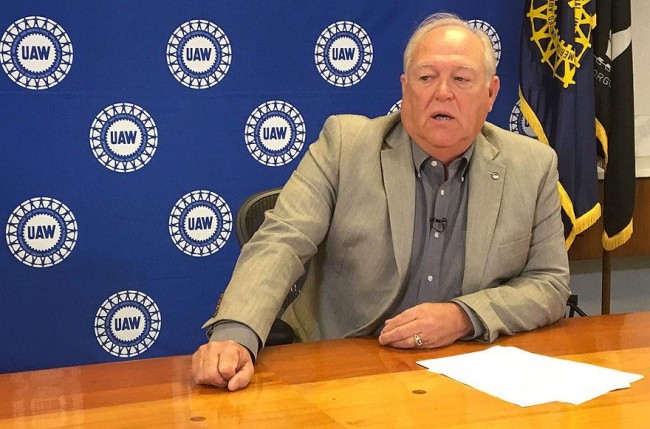The controversy over U.S. automakers’ moving production to Mexico continues to simmer. In this interview with reporters including John Irwin of Automotive News, UAW President Dennis Williams says, “It’s all about cheap labor.”
UAW President Dennis Williams criticized automakers for moving vehicle production to Mexico while taking issue with the notion that the union negotiated such moves last year in return for the end of tiered wages for workers and investments in U.S. plants.
Williams, speaking with reporters Thursday May 19 at a media roundtable in Detroit, said automakers are “taking the easy way out” by shifting car production to low-wage countries such as Mexico.
Detroit 3 investments in Mexico “should raise all of our eyebrows because it isn’t about a country that’s buying a lot of vehicles,” Williams said. “It’s about cheap labor.”
The Detroit 3 have come under fire from the UAW, as well as presumptive Republican presidential nominee Donald Trump, for shifting car production to Mexico while opting to produce more profitable pickups, crossovers and SUVs in the U.S.
Ford Motor Co. is the latest automaker to invest in Mexico, saying last month that it will spend $1.6 billion for a new vehicle assembly plant northwest of Mexico City.
GM to stand alone
Earlier this year, FCA CEO Sergio Marchionne disclosed that FCA was looking for another automaker to build the Chrysler 200 and Dodge Dart so that the company could retool two U.S. plants to build the more profitable Ram pickup and Jeep SUVs.
General Motors will be the only U.S. automaker still producing compact or midsize cars in the U.S. by 2019, as laid out in the companies’ labor agreements with the UAW.
Williams denied suggestions the union paved the way for a shift in some vehicle output to Mexico in return for the end of controversial tiered wages when the UAW negotiated major labor contacts with the Detroit 3 in 2015.
“We never had any discussions, nor would we ever entertain any discussions, about negotiating products into Mexico,” Williams said, adding that the union was focused on investments in the U.S. plants.
He said automakers are putting profits over the well-being of U.S. workers and the health of the economy.
“How much profit do you need to make?” Williams said. “We all want [the automakers] to be successful. But at what expense?”
He said the UAW would look at ways to promote collective bargaining in Mexico.
“Mexico would be a great trading partner if they had free unions … if they had the ability to raise people’s standards of living so they became a consumer and not be used for slave labor,” Williams said.
No to Trump
Williams blasted Trump as a candidate who lacks depth and does not have the best interest of American workers at heart.
While he said the UAW will endorse a presidential candidate “soon,” he declined to say who the union might support or if it will make an endorsement before the California Democratic primary on June 7.
However, he said the union ruled Trump out “real quick” after the candidate suggested in an August interview withThe Detroit News that moving Detroit 3 production from Michigan to lower-wage U.S. states could prevent automakers from shifting output to Mexico.
“I don’t know how that’s helping the middle class or how that’s helping the American workers, and it’s certainly not helping UAW members,” Williams said. “That’s the wrong kind of leadership.”
Trump places the blame on shifting auto jobs on poorly negotiated free trade agreements. He has repeatedly blasted Ford, saying he would implement a 35 percent tax on vehicles the company produces in Mexico to encourage a shift in production back to the U.S.
Williams said Trump has few details to offer beyond his standard talking points.
“‘I’m going to make America great.’ What does that mean?” Williams said, referring to Trump’s campaign slogan, “Make America Great Again.”
He said the UAW, which has more than 1 million members, including retirees, will be “all in” for the Democratic nominee once it issues an endorsement. Former Secretary of State Hillary Clinton is considered the heavy favorite for the Democratic nomination, though she faces competition from Sen. Bernie Sanders, D-Vt.
The primary fight between Clinton and Sanders has often been contentious, with Sanders saying Clinton’s ties to Wall Street and past support of free trade agreements make her a weaker choice for the nomination than him.
Williams said Clinton should not be blamed for the North American Free Trade Agreement, the divisive agreement signed into law by her husband, President Bill Clinton. The UAW and Sanders are opponents of the agreement, while Clinton has distanced herself from the pact on the campaign trail.
“I don’t blame Hillary Clinton for [NAFTA],” Williams said. “That was Bill Clinton.”
He said he expects the Democratic Party to eventually rally around its nominee, as it did when Barack Obama was nominated in 2008 following a heated battle with Hillary Clinton.
He said a poll of UAW members last year found that Trump had 28 percent support, though he said that number has likely declined following Trump’s comments to The News. He did not say what percentage of votes Clinton or Sanders received.
By John Irwin for Automotive News
Source: automotivenews.com



